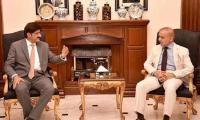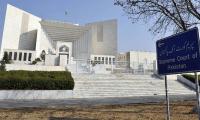ISLAMABAD: Chairman Senate Mian Raza Rabbani said Tuesday that all decisions, except day to day working, pertaining to or related with these matters shall be taken by the Council of Common Interest (CCI), as this entry fell in Part II of the Federal Legislative List of the Constitution.
In a ruling, he read out in the House, Rabbani ruled that the government should frame a policy as to the extent of involvement of international donor/ organisation into the internal affairs of the federation especially its policies and legislations and the same shall be placed before the both houses of Parliament for approval within a period of two months.
“Upon perusal the herein stated legal and factual position, in particular the view taken by the federal government and the provinces, reflects a serious difference of opinion between the federal and the provincial governments with regard to the interpretation of Clause (3) Article 172, of the Constitution, 1973. The federal government is taking the position that the said constitutional provision stands implemented while the provinces are, time and again, raising the issue as to implementation and interpretation of Clause (3) of Article 172, Constitution, 1973 at the forum of the CCI,” he noted.
He said the intent of the drafters of the 18th constitutional amendment read with the proceedings of the Implementation Commission clear the mist that when Clause (3) in Article 172, Constitution, 1973, was inserted the intent of the legislation was to provide equal ownership of mineral, oil & natural gas within the province or territorial waters adjacent to a province.
“The federation is required to exercise the authority in executive, administrative and regulatory spheres jointly and equally with the province. In terms of the new role of the federation and the provinces, as conceived by Clause (3) of Article 172, Constitution, 1973, a new mechanism was to be devised to exercise joint authority by the federation and the provinces with regard to executive, administrative and regulator dimensions of the oil and gas,” he said.
For this reason, he argued, the Implementation Commission decided that a regulatory authority may be established through an act of Parliament giving due representation and share to the provinces.
From the briefing of the Ministry of Petroleum it appears that the office of Director General Petroleum Concessions has been assumed by the federal government as a substitute of the regulatory authority to be established by an act of Parliament.
Rabbani said, “This is mainly the reason that the provinces are consistently complaining about no or minimal consultation with them regarding the decisions being taken with regard to the oil and gas sector. Not a single province is satisfied with the operationalisation of Clause (3) of Article 172, Constitution, 1973 and contest the federal government position”.
He recalled the prime minister made a statement in the House on 20-12-2017 that World Bank was engaged as a consultant and that engagement has ended. Notwithstanding the position taken by the prime minister of Pakistan, an attempt to delink the petroleum and natural gas regulator from provincial oversight in contravention of the constitutional provisions by playing with a draft law on the dictates of the World Bank is unacceptable. I will not go into the merits of the said draft law as it has not been introduced in Parliament and is a mere piece of paper.
But it is unfortunate that the federation, he emphasised, did not act upon the decisions of the Implementation Commission for bringing a balanced law for the regulation of joint control of oil and gas, however, was willing to act upon the policy being provided by the World Bank which will impinge upon the constitutional rights of the provinces. This is not a first case, since the passage of 18th Amendment to the Constitution some foreign organisations/donors are trying hard to roll back the scheme of devolution.
Natural resources including oil and gas, he noted, are strategic assets of the State which are directly linked with the national security of the country. Interference of International donor especially IMF and World Bank in policy decisions and legislations, in any form, exposes the national security of the country which can be manipulated to the disadvantage of the State, therefore, giving access to international donors/organisation into the internal affairs of the federation is not only unconstitutional but can prove to be a serious threat to the national security of Pakistan.
The government should frame a policy as to the extent of involvement of international donor/organisation into the internal affairs of the federation especially its policies and legislations and place the same before the Parliament for approval.
As a consequence of the reference forwarded by the Functional Committee on Devolution, which sought interpretation of Clause (3) of Article 172 of the Constitution, 1973, and as a result of the debate held in the House, I am constrained to interpret the said article for the benefit of the Committee and the House in these:
{C}(i) {C}Clause (3) of Article 172 of Constitution, 1973, provides for equal ownership of mineral, oil & natural gas within the province or the territorial waters adjacent to a province (fifty percent belonging to the federal and fifty percent to the province) and the federation is required to exercise its authority in the executive, administrative and regulatory sphere jointly and equally with the province.
On October 20, 2017, the Functional Committee on Devolution, the Senate of Pakistan, made a reference to the chairman Senate, to the affect, if requirements of Clause (3) of Article 172, Constitution of Pakistan, 1973, have been complied with.
PTI leader Azam Khan Swati. — The News/File ISLAMABAD: A local court on Tuesday confirmed the bail of PTI’s...
An exterior shot of the FIA headquarters. — Facebook/FileISLAMABAD: The Federal Investigation Agency , breaking a...
Sarhad Chamber of Commerce and Industry president Fuad Ishaq. — Facebook/Fuad Ishaq PESHAWAR: Sarhad Chamber of...
Sarfraz Bugti. — APP/FileQUETTA: Balochistan Chief Minister Sarfaraz Bugti has said that a committee is being formed...
Chairman Joint Chiefs of Staff Committee General Sahir Shamshad Mirza conferred civil awards to the eminent...
Former federal minister Fawad Chaudhary. — APP/FileMULTAN: Former Pakistan Tehreek-e-Insaf leader Fawad Chaudhry has...







